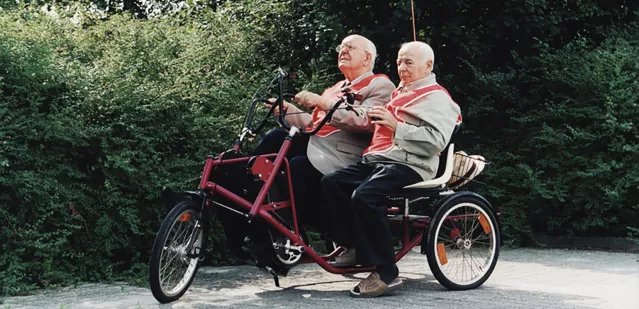
1. Person-centred care is a must
During her research, so-called ‘mappers’ observed older people with intellectual disabilities at 12 locations of 6 different care organisations in the northern part of the Netherlands. Around 4-6 persons at a time, for six hours. Feija: “By observing for a longer period of time and quite intensively, you gain insight into what clients experience during the day and what happens whenever an employee isn’t around. Doors open and close, cold draughts, a restless co-client; any small detail can influence a client’s well-being. These observations produce insights into the client’s personal needs and the way they perceive the care they receive. Based on this, the way the care is provided can be adjusted. This is truly person-centred care,” Feija nods. “My research also showed that care professionals gained more practical knowledge and skills, because of this approach.”
2. Bridge the gap between care and well-being
“At the moment, care professionals often have little awareness of the link between care and well-being,” Feija states. “A reason for this could be that historically, intellectual disabilities care focuses on a client’s social participation,” she explains. On the other hand, the actual care for a client becomes more of a topic as they grow older. A combination of these two could be a better way to go about it. Additionally, care professionals are a committed people. Clients are almost like family to them. More often than not, they provide care for the same people over a longer period of time. This raises the possibility that care fails to develop in conjunction with the care needs of the client. DCM is one of the methods that could support care professionals with this.”
3. Keep the person in mind
Clients are often talked about in care. Feija thinks this is also a matter of awareness. “We would like to keep the person in mind and put them first. That is why we do not speak of ‘the intellectual disabled,’ but people with intellectual disabilities,” she explains. “It is a way of putting people first. Words are important as they fuel the general perception,” stresses Feija.
Moreover, Feija believes that care organisations should make person-centred care a part of the organisation’s DNA. “Individual care is not the same as person-centred care and putting yourself in the client’s shoes,” Feija emphasises. “And it goes beyond daily practice; it should be infused in everything up until, and including, a care organisation’s mission and vision statement.
4. Include the whole organisation in care matters
As far as Feija is concerned, the feedback from the observations should be an organisation-wide affair. “It is preferable to include as many people in the organisation as possible,” she argues. “From cleaners to upper management, because they all play a role in the lives of the clients. This is how you collect every bit of available information about a client, which ensures care being carried out and represented in a uniform way.”
Symposium
Would you like to gain additional insight into Feija’s research and Dementia Care Mapping in general? Please visit the ‘Persoonsgerichte zorg voor ouderen met een verstandelijke beperking’ symposium on Thursday 16 May from 1 to 4.30pm. Please note that most presentations and workshops will be in Dutch. Claire Surr (Leeds Beckett University) will give a presentation in English, titled ‘What is Person-centred dementia care? An introduction to the Evidence’ at around 1pm. Feija’s research paper will be available in English upon request. Please contact her for any additional information at feija.schaap@nhlstenden.com.



